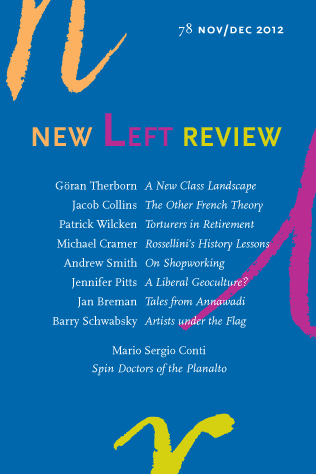From São Paulo to Beijing, a rising middle class has been hailed by liberal commentators as a bulwark for consumption and democracy in the decades ahead. Taking stock of these claims, Göran Therborn offers a magisterial overview of the global class landscape and the still prodigious numerical weight of manual workers within it.
Alongside the familiar pathways of French post-structuralist thought, Jacob Collins detects an alternative trajectory in the work of four thinkers whose allegiances span the political spectrum. The return to ethnographical concepts of social belonging—fraternity, family, faith—amid the multiple crises of the 1970s.
Unlike its neighbours, Brazil has yet to confront the crimes of its military dictatorship. As a Truth Commission sifts evidence of torture, killings and disappearances—many of whose survivors are now in high office—what will be the upshot of a belated accounting with the past?
A leading journalist considers the transformations in Brazil’s media sphere in the post-dictatorship period. Reporters turned marketeers, policies become products, money and power ever more tightly interwoven, within a landscape reformatted by new technologies.
A meditation on the peculiar relations of power between customers and retail staff, informed by direct experience. Required to enforce the logic of a system over which they have no control, shopworkers take refuge in forms of tacit resistance, distancing themselves from their ambiguous role in the circuits of modern capitalism.
Why did the director of Rome Open City and Journey to Italy devote himself to a vast philosophical-historical education project? Michael Cramer explores the conceptual underpinning and aesthetic iconoclasm of Rossellini’s TV epics.
Jennifer Pitts on Immanuel Wallerstein, The Modern World-System IV: Centrist Liberalism Triumphant, 1789–1914. A seminal multi-volume account of the ‘capitalist world-economy’ reaches the long 19th century.
Barry Schwabsky on Anne Wagner, A House Divided: American Art since 1955. Painting and sculpture in the age—and shadow—of US hegemony.
Jan Breman on Katherine Boo, Behind the Beautiful Forevers. Close-quarters chronicle of life in a Mumbai slum-settlement.
